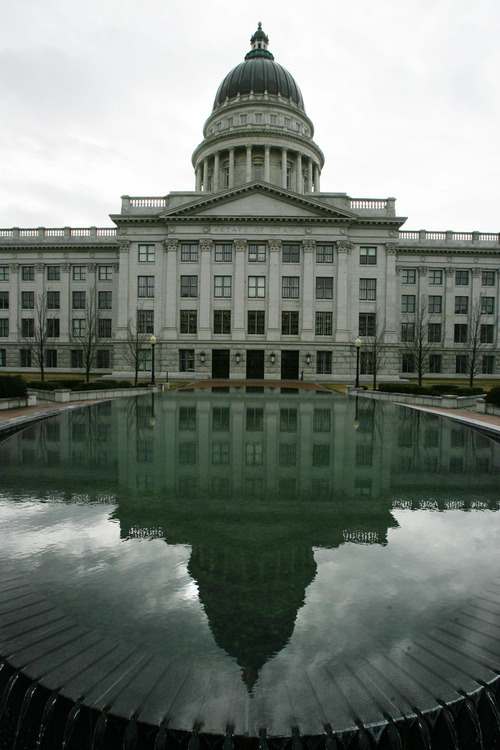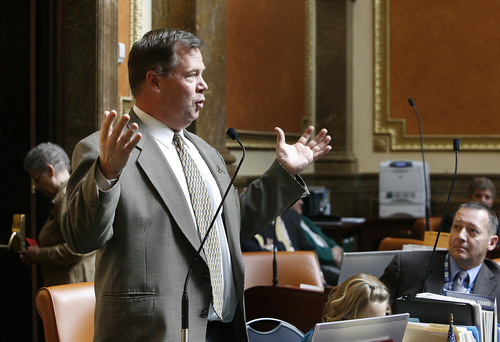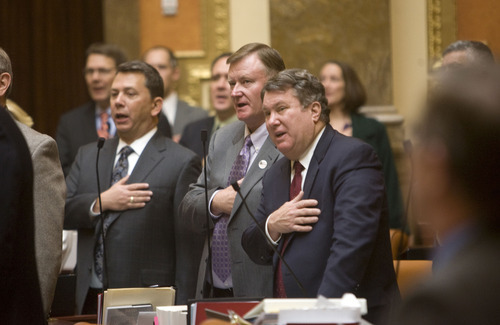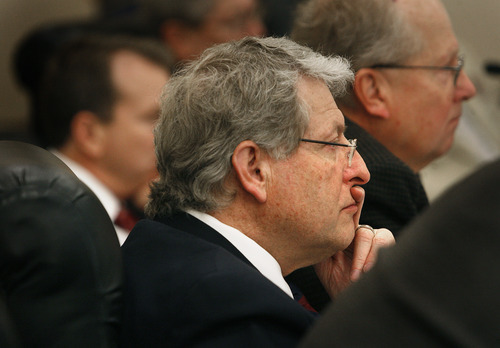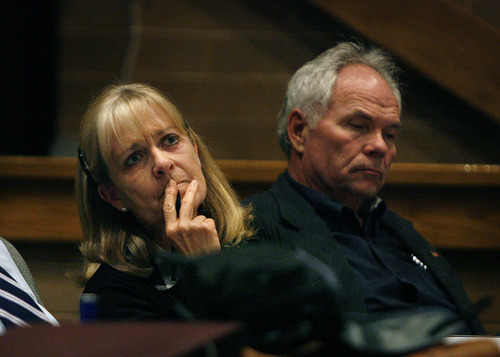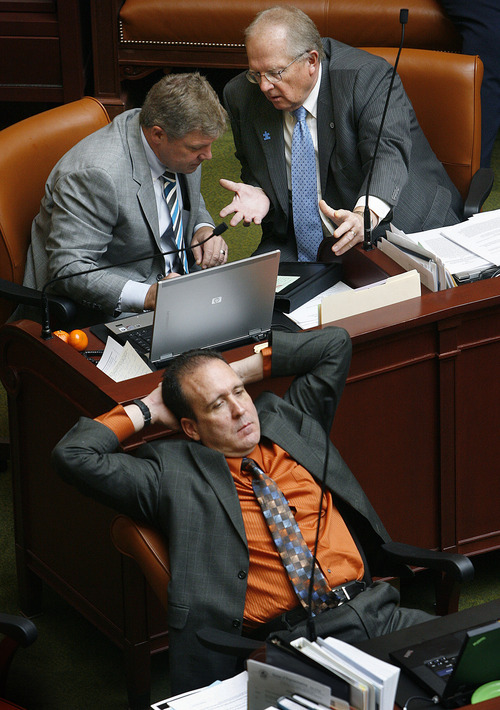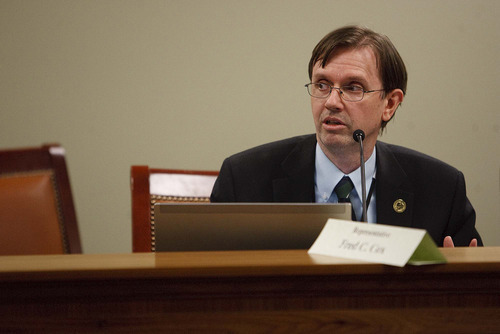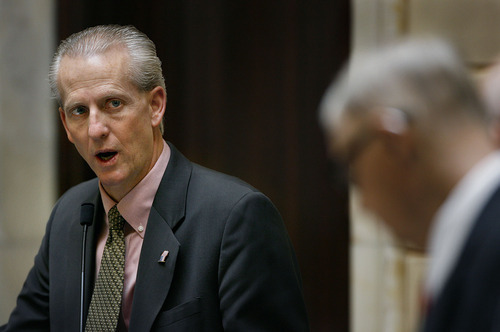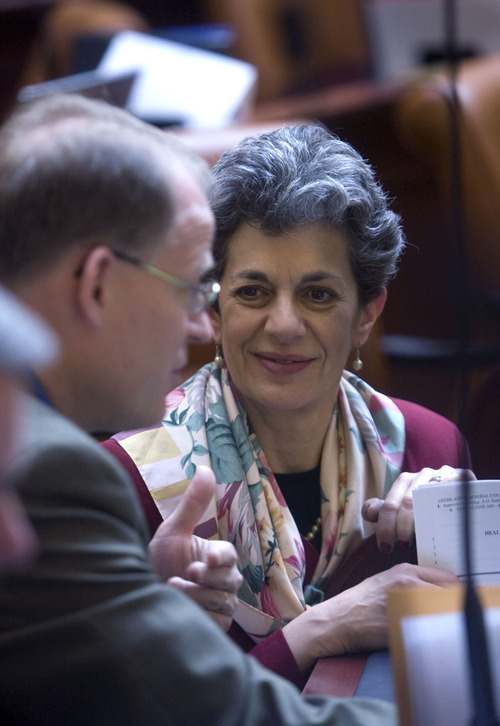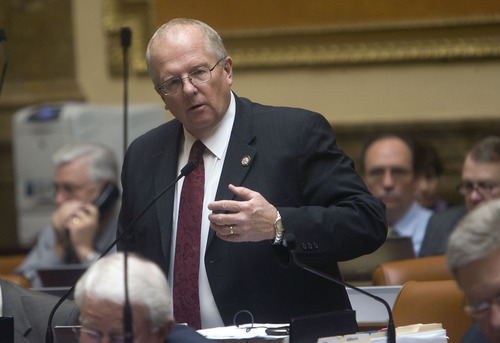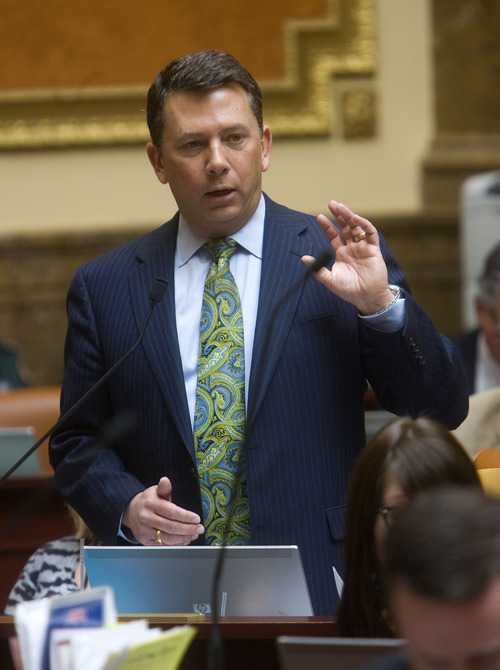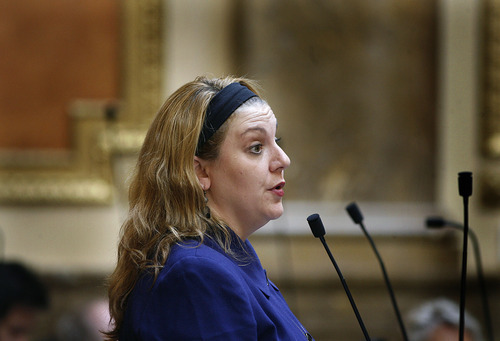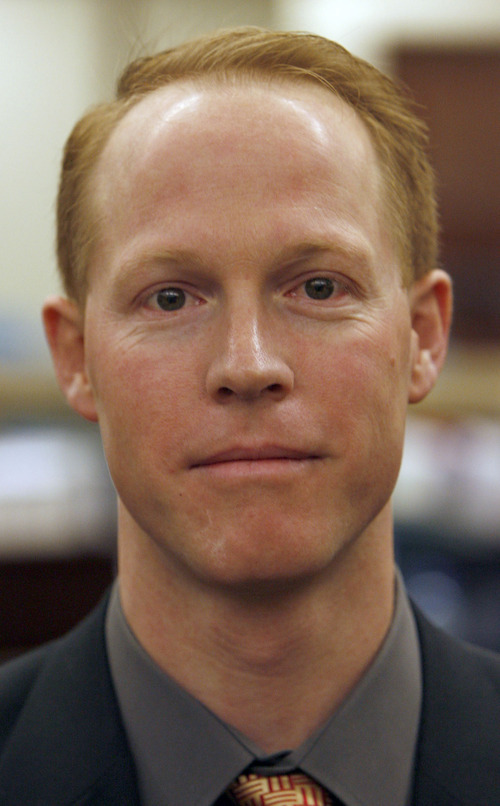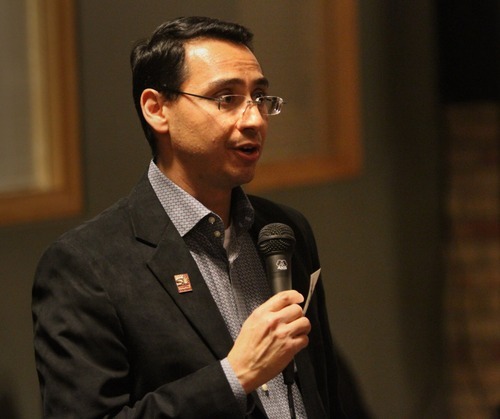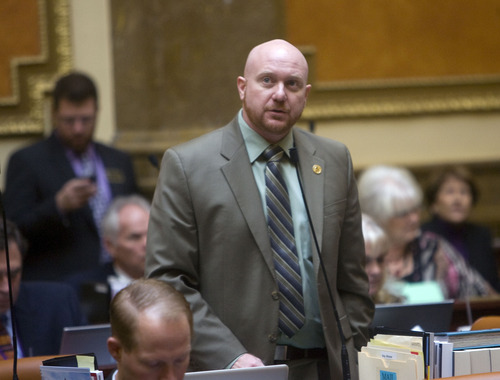This is an archived article that was published on sltrib.com in 2012, and information in the article may be outdated. It is provided only for personal research purposes and may not be reprinted.
In Utah, the question isn't whether the LDS Church wields hefty political clout, but how it does so. And the answer, according to state legislators, may surprise some.
That Mormon influence, lawmakers say, does not generally come from edicts over the pulpit or through lobbying in the halls of the Capitol. Instead, it comes indirectly — mainly through legislators' own religious views.
After all, most elected officials here are Latter-day Saints who vote based on values instilled in them as Mormons — and even non-LDS officials try to reflect the will of constituents who are overwhelmingly Mormon.
But lawmakers concede that the state's predominant faith is directly involved on a few select issues, such as immigration, alcohol, gambling and gay rights — and a nod of approval from the LDS hierarchy is usually needed for bills affecting those areas to proceed, according to a questionnaire sent to legislators by The Salt Lake Tribune.
"People should understand that on a few occasions, the LDS Church does give input on issues. But that is all, and I am always told to vote my conscience and represent my constituents," says Rep. Stephen Sandstrom, R-Orem. "The myth that they tell you how to vote is just that — a myth."
Such responses come as Republican Mitt Romney's presidential campaign has made some Americans question how much influence the Salt Lake City-based LDS Church has with its politician members.
The Tribune emailed a questionnaire to all 104 members of the Utah Legislature asking to what church they belong; what positions they have held in their religion; and what sort of political sway they believe the LDS Church has in the Legislature and how that influence comes. About a third of the lawmakers (31) answered. A chart with excerpts of responses from all of them is online at sltrib.com.
—
Lobbying rare • Most, but not all, respondents say they have never been lobbied by the LDS Church.
"I wouldn't know the chief LDS Church lobbyist if he walked in the door and sat right down next to me," says Rep. Stephen Handy, R-Layton, who has led Mormon congregations as a bishop and stake president. "I have never had the church reach out to me regarding issues of liquor control or any other matter."
He says he did approach the church once to see if it had a position on "one matter of public policy."
"I was told on this matter that I should proceed or not according to my conscience," Handy says. "I think it's only normal for members of the Legislature, whether they are LDS or not, to consider the views of the state's largest constituency."
Rep. Brad Daw, R-Orem, who has served in an LDS bishopric, says he, too, has been lobbied by the church "exactly zero times in eight years in the House."
Rep. Eric Hutchings, R-Kearns, who is LDS, sounds a similar tune. "In all my time serving the Legislature," he says, "I have never once been approached by anyone from the LDS Church on any bill, or any other legislative issue. Literally. Not once."
House Minority Whip Jennifer Seelig, D-Salt Lake City, a Methodist, sees a difference between religious influence in Utah politics versus the Bible Belt, where she grew up.
"In comparison to Kentucky, the LDS Church is not that directly active in politics," she says. "Everyone makes decisions based on their values, and religion is a big part of those values."
—
Shared values • Many Utah legislators argue that the LDS Church does not need to send formal directions, since most lawmakers are Mormons and share the faith's guiding ideals.
"I do not see legislators looking to the church for guidance," says Rep. Evan Vickers, R-Cedar City, who twice has been an LDS bishop, "but rather to their beliefs and value system, which in many cases their religious affiliation will have an effect on."
Rep. Curt Webb, R-Logan, a former LDS bishop, says Mormon legislators share common values that cut across party lines. "It is also true," Webb says, "that those same values are shared by those here of other faiths."
Rep. Keith Grover, R-Provo, who has served in LDS bishoprics, says "members of the Legislature follow the tenets of their religion, regardless of what the religion is. My religious beliefs are part of who I am, and those definitely factor in when I am deciding how to cast my vote."
Some lawmakers estimated that 90 percent of the 75 Utah House members are LDS, and that 27 of 29 senators are.
Of the 31 lawmakers who answered the questionnaire, 24 are LDS (77 percent), two are Catholic, two are Methodist, one is Jewish, one is Episcopalian and one belonged to no church. Of the LDS respondents, half reported having held high leadership church positions ranging from bishoprics and stake presidencies to women's Relief Society presidencies.
Membership numbers provided to the state by the LDS Church indicate that 62 percent of Utah's population is Mormon.
—
When the church lobbies • Several lawmakers say the church does lobby on a few issues, such as alcohol, immigration, gambling and gay rights.
Freshman Rep. Brian Doughty, D-Salt Lake City, who says he does not belong to a church, discovered the LDS Church is "very involved" in alcohol regulations when he ran a bill to require that the Utah Liquor Commission include some drinkers.
He says he was told that "I would have to have approval from the LDS Church for something such as that to be considered. I did not consult with the LDS Church and got the bill out of committee. It was next to be debated … when the board was wiped of all remaining bills as we finished our work on House bills."
Senate Minority Leader Ross Romero, D-Salt Lake City, a Catholic, says he offered a bill this year to make it easier for restaurateurs to sample wines. He says he talked to LDS leaders about it and made several concessions. The measure still failed.
"It's challenging," Romero says, "but I realize that, at the end of the day, I have to get enough votes to pass a bill, and it will have to reflect the wishes and values of the majority."
Romero recalls he once pushed the LDS Church to get more involved — on immigration — and it did. He says Bishop John C. Wester of the Salt Lake City Catholic Diocese had become a leading national advocate for compassion and humane treatment of undocumented workers.
"The LDS voice had been missing," Romero says.
So he urged Mormon leaders to make their position known — and provided a memo outlining his own feelings. He was pleased to see that when the LDS Church supported the so-called Utah Compact on immigration that its statements were close to many of his own views.
But the LDS Church's approach was still low key enough on the immigration that some members say they missed it.
"I didn't even find out about the LDS Church's support of HB116 [a guest-worker bill] until after I cast my vote and heard that an LDS Church leader was at the signing ceremony," says Rep. Derek Brown, R-Cottonwood Heights, who is Mormon.
Similarly, Rep. Fred Cox, R-West Valley City, says he tried to contact LDS leaders after the session to clarify where the church stood on the same bill. "They wouldn't return my emails or phone calls but did eventually send out an updated statement that did help some with civility on immigration."
Senate Majority Whip Wayne Niederhauser, R-Sandy, who is Mormon, says he has been lobbied a "few" times by the LDS Church, but always in a "soft sell" way.
"I was never told how to vote," he says. "Church representatives merely stated the church's position on the issues."
—
Fake claims • Legislators report that sometimes colleagues or other groups claim support or opposition from the LDS Church that does not really exist — except perhaps in someone's own mind —as ways to advance or kill bills.
Rep. Christine Watkins, D-Price, who is LDS, says she was pushing a measure this year affecting the adoption rights of unmarried biological fathers. She says "an attorney told a committee member that 'the church' would take a position against [it]. I contacted [chief LDS lobbyist] Bill Evans from the church, and he indicated that was news to him."
"Sometimes," says Rep. Patrice Arent, D-Millcreek, who is Jewish, "LDS legislators are more concerned about the position of conservative groups like the Eagle Forum than the position of the LDS Church, when the church position is considered more 'moderate.'
"For example, I recall one year when an abortion bill was being considered. An amendment was made for an exception which would have allowed for an abortion in very limited circumstances. This was the precise position of the LDS Church. In fact, the language came from the LDS Church.
"Everyone in the Senate knew that, but only Democrats would vote for the position of the LDS Church," out of fear that many Mormons had stricter stands on abortion than their own church. "I think the same thing happened in the House."
—
'Big tent' • Although legislators say LDS politicians bring plenty of Mormon influence even though LDS lobbying is relatively rare, they also say wide disagreement remains among Mormons on key issues — and finding one church position on any issue is rare.
Even though most lawmakers are LDS, Webb says, "we constantly war over issues of policy. Often when we agree on a moral issue, we will battle over approaches to that issue, even when the church weighs in."
He adds, "My constituents are overwhelmingly LDS but reflect the same pattern: common values and vastly diverse opinions about policy and approach."
Rep. Mike Noel, R-Kanab, a former LDS bishop, notes that the worldwide Mormon faith offers a "big tent."
"Otherwise," he says, "how could you have a Harry Reid [liberal Nevada Democratic senator], a [conservative Utah Sen.] Mike Lee, a [moderate] Jon Huntsman and a Mitt Romney all serving as elected officials of the same religion?"
Says Doughty as he finished his first general session this year, "It was interesting to see that the Legislature is not as much of a puppet to the LDS Church as I had assumed. Having said that, I do feel there is some influence there when it is needed or wanted."
More on the Web
O To read excerpts from The Salt Lake Tribune's survey of Utah lawmakers, go to › http://bit.ly/GBcz94.


